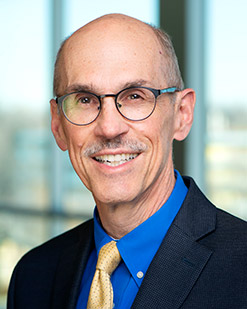$8.5M Grant Awarded to Improve Asthma Care with the Navajo Nation
National Jewish Health and the University of Arizona bring proven programs to assist underserved population
DENVER, CO —
 An $8.5 million grant from the National Heart, Lung, and Blood Institute will bring to the Navajo Nation two widely successful programs that will aim to improve asthma care over a six-year period. This is the first large effort to address health disparities in the Navajo Nation where asthma rates are two to three times higher than in the general population.
An $8.5 million grant from the National Heart, Lung, and Blood Institute will bring to the Navajo Nation two widely successful programs that will aim to improve asthma care over a six-year period. This is the first large effort to address health disparities in the Navajo Nation where asthma rates are two to three times higher than in the general population.
The project will be managed through a collaboration between National Jewish Health, the nation’s leading respiratory hospital, and the University of Arizona Health Sciences Asthma and Airway Disease Research Center. The project will utilize the National Jewish Health Asthma Toolkit Program that has been used to teach caregivers across Colorado how to diagnose and manage asthma, and the University of Arizona School Asthma Program, which has provided asthma education and care coordination through public and private schools. The grant is one of only four awarded to reduce health disparities for children with asthma.
“This is by far the largest and most exciting project I’ve been involved with,” said Bruce Bender, PhD, co-principal investigator, head of the Division of Pediatric Behavioral Health and co-director of the Center for Health Promotion at National Jewish Health. “Our overall goal is to build a lasting program that is sustainable for the people of the Navajo Nation.”
 “I am very excited to be part of this important collaboration with the Navajo Nation. The health care facilities, schools, epidemiology center, and community members have been very supportive, and I believe we can work together to reduce childhood asthma disparities on the Navajo Nation,” said Lynn Gerald, PhD, MSPH, co-principal investigator, associate director for clinical research with the Asthma and Airway Disease Research Center at the University of Arizona Health Sciences and Canyon Ranch Endowed Chair and professor at the UA Mel and Enid Zuckerman College of Public Health,. Dr. Gerald will lead an effort to teach children, families, teachers and school nurses how to manage asthma.
“I am very excited to be part of this important collaboration with the Navajo Nation. The health care facilities, schools, epidemiology center, and community members have been very supportive, and I believe we can work together to reduce childhood asthma disparities on the Navajo Nation,” said Lynn Gerald, PhD, MSPH, co-principal investigator, associate director for clinical research with the Asthma and Airway Disease Research Center at the University of Arizona Health Sciences and Canyon Ranch Endowed Chair and professor at the UA Mel and Enid Zuckerman College of Public Health,. Dr. Gerald will lead an effort to teach children, families, teachers and school nurses how to manage asthma.
Community advisory committees will be created to provide guidance and help form working partnerships with school systems, the Navajo Health Department, chapter houses and any other interested community groups.
“By bringing two proven, successful programs to the Navajo Nation, we’re hopeful and optimistic that we can have a lasting impact on asthma care,” said Dr. Bender.
The programs will be implemented in Tuba City, Chinle and Fort Defiance on the Navajo Nation. The programs will occur consecutively, one year each in each of the locations. This approach will allow investigators to compare outcomes before and after the program within each community. After the final program, there are two follow-up years where sustainability will be evaluated.
Researchers will measure several outcomes in each community. They will look at whether the program has reduced asthma exacerbations by looking at changes in urgent care visits, hospitalizations, oral steroid bursts, and whether families are filling the child’s prescribed asthma medication.
The UAHS Asthma and Airway Disease Research Center was established in 1971 as the Arizona Respiratory Center, the UA’s first Center of Excellence. For almost half a century, the center has been recognized worldwide for the outstanding contributions of scientists to the understanding of the natural history, pathogenesis, genetics, genomics and treatment of asthma and chronic obstructive pulmonary disease. The center is part of the University of Arizona Health Sciences, the statewide leader in biomedical research and health professions training. The UA Health Sciences includes the UA Colleges of Medicine (Phoenix and Tucson), Nursing, Pharmacy and Mel and Enid Zuckerman College of Public Health, with main campus locations in Tucson and the growing Phoenix Biomedical Campus in downtown Phoenix. From these vantage points, the UA Health Sciences reaches across the state of Arizona and the greater Southwest to provide cutting-edge health education, research, patient care and community outreach services. For more information, visit uahs.arizona.edu.
National Jewish Health is the leading respiratory hospital in the nation. Founded in 1899 as a nonprofit hospital, National Jewish Health today is the only facility in the world dedicated exclusively to groundbreaking medical research and treatment of children and adults with respiratory, cardiac, immune, and related disorders. Patients and families come to National Jewish Health from around the world to receive cutting-edge, comprehensive, coordinated care. To learn more, visit the media resources page.
Media Resources
We have many faculty members, from bench scientists to clinicians, who can speak on almost any aspect of respiratory, immune, cardiac and gastrointestinal disease as well as lung cancer and basic immunology.
Media Contacts
Our team is available to arrange interviews, discuss events and story ideas.
- Adam Dormuth
303.398.1002 office
970.222.5034 mobile
dormutha@njhealth.org - Jessica Berry
303.398.1082 office
303.807.9491 mobile
berryj@njhealth.org
